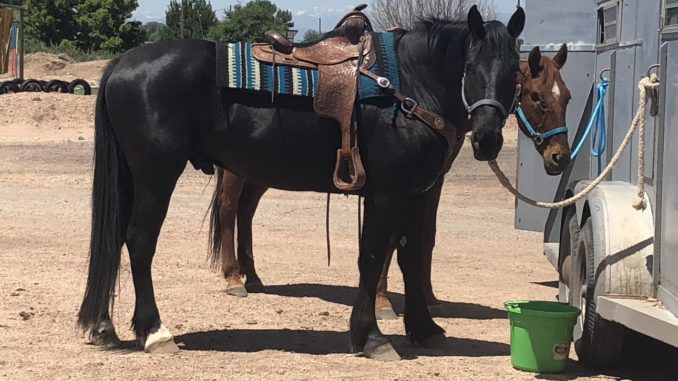
By Mary Peck
Colorado has become the third state in the U.S. to have confirmed cases of vesicular stomatitis (VSV). Previous positive cases of vesicular stomatitis in 2019 have been diagnosed in Kinney and Tom Green counties in Texas and in Sandoval County, New Mexico.
On July 3rd, the National Veterinary Services Laboratory reported positive test results on samples submitted from two horses in Weld County. The two horses reside on separate locations in Weld County and have been placed under quarantine. The initial Colorado disease investigation was completed by a field veterinarian from the State Veterinarian’s Office at the Colorado Department of Agriculture.
“Vesicular stomatitis can be painful for animals and costly to their owners,” said Colorado State Veterinarian, Dr. Keith Roehr. “The virus typically causes oral blisters and sores that can be painful causing difficulty in eating and drinking.”
The Weld County epidemiological investigation indicates an incursion of VSV-infected insect vectors is the likely source of infection. Biosecurity measures and vector mitigation have been instituted on both locations to reduce the potential spread of the virus. The animals are being monitored daily and the index premises will remain under state quarantine until at least 14 days from the onset of lesions in the last affected animal on the premises. There are no USDA approved vaccines for VSV.
Vesicular Stomatitis Background
Vesicular stomatitis is a viral disease that primarily affects horses and cattle, and occasionally swine, sheep, goats, llamas, and alpacas. The transmission process of VSV is not completely understood, but includes insect vectors such as black flies, sand flies, and biting midges.
The incubation period ranges from 2-8 days. Clinical signs include vesicles, erosions, and sloughing of the skin on the muzzle, tongue, teats, and coronary bands. Often excessive salivation is the first sign of disease, along with a reluctance to eat or drink. Lameness and weight loss may follow.
Humans may become infected when handling affected animals, but this is a rare event. To avoid human exposure, individuals should use personal protective measures when handling affected animals.
Tips for Livestock Owners
-
Strict fly control is an important factor to inhibit the transmission of the disease.
-
Avoid transferring feeding equipment, cleaning tools or health care equipment from other herds.
-
Colorado veterinarians and livestock owners should contact the state of destination when moving livestock interstate to ensure that all import requirements are met. Contact information for all state veterinarian offices is listed here.
-
Colorado fairs, livestock exhibitions, and rodeos may institute new entry requirements based on the extent and severity of the current VS outbreak. Certificates of veterinary inspection (CVIs or health certificates) issued within 2-5 days prior to an event can be beneficial in reducing risks. Be sure to stay informed of any new livestock event requirements. See the Vesicular Stomatitis Guidelines for Shows and Fairs.
Important Points for Veterinarians
Any vesicular disease of livestock is reportable to the State Veterinarian’s Office in Colorado – to report call 303-869-9130. If after hours, the voice message will indicate which staff veterinarian on call.
Additional resources
Support Northern Colorado Journalism
Show your support for North Forty News by helping us produce more content. It's a kind and simple gesture that will help us continue to bring more content to you.
BONUS - Donors get a link in their receipt to sign up for our once-per-week instant text messaging alert. Get your e-copy of North Forty News the moment it is released!
Click to Donate